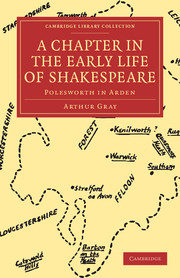Book contents
- Frontmatter
- Contents
- ILLUSTRATIONS
- SECTION 1 The Problem stated
- SECTION 2 The Marlowe fiction
- SECTION 3 The Greenwood theory
- SECTION 4 The Stratford legend
- SECTION 5 Does Shakespeare rail?
- SECTION 6 William Shakespeare, gentleman
- SECTION 7 Concerning Genius
- SECTION 8 Stratford fact and fable
- SECTION 9 The flight to London
- SECTION 10 Shakespeare's silence about Stratford
- SECTION 11 Concerning Arden
- SECTION 12 Of Poets, Patrons and Pages
- SECTION 13 What happened in 1572
- SECTION 14 Polesworth
- SECTION 15 Shakespeare in North Warwickshire
- SECTION 16 Shakespeare's road to London
- SECTION 17 Michael Drayton
- SECTION 18 The Polesworth circle
- SECTION 19 The Gooderes
- SECTION 20 The Sonnets
- SECTION 21 Southampton
- SECTION 22 Warwickshire scenes in Shakespeare's youth
- SECTION 23 The last days
- Plate section
SECTION 16 - Shakespeare's road to London
Published online by Cambridge University Press: 07 September 2010
- Frontmatter
- Contents
- ILLUSTRATIONS
- SECTION 1 The Problem stated
- SECTION 2 The Marlowe fiction
- SECTION 3 The Greenwood theory
- SECTION 4 The Stratford legend
- SECTION 5 Does Shakespeare rail?
- SECTION 6 William Shakespeare, gentleman
- SECTION 7 Concerning Genius
- SECTION 8 Stratford fact and fable
- SECTION 9 The flight to London
- SECTION 10 Shakespeare's silence about Stratford
- SECTION 11 Concerning Arden
- SECTION 12 Of Poets, Patrons and Pages
- SECTION 13 What happened in 1572
- SECTION 14 Polesworth
- SECTION 15 Shakespeare in North Warwickshire
- SECTION 16 Shakespeare's road to London
- SECTION 17 Michael Drayton
- SECTION 18 The Polesworth circle
- SECTION 19 The Gooderes
- SECTION 20 The Sonnets
- SECTION 21 Southampton
- SECTION 22 Warwickshire scenes in Shakespeare's youth
- SECTION 23 The last days
- Plate section
Summary
I have pointed out that in none of his plays dealing with English scenes does Shakespeare show any acquaintance with places on the Stratford-London road. The evidence of those plays does show a decided familiarity with the road between North Warwickshire and London. In the greater part of its course that road follows the route of the old Watling Street. It was the road by which Johnson, the editor, and Garrick, the actor, of Shakespeare's plays, travelled from Lichfield, ‘riding and tying,’ on their way to London. It was also the road taken by Drunken Barnabee in his celebrated Itinerarium (written c. 1638). It is worth while noting the route which he followed and the places that he stopped at.
Travelling on foot, he supped at Lichfield, next day crossed into Warwickshire, and before night got to Meriden. Next day, going by Coventry, he reached Dunchurch, a resort of highwaymen, but ‘safe he sings whose purse is empty.’ Early next morning he ‘boused’ at Daintree (Daventry), got a lift in a carrier's wagon at Weedon, and caroused all night (Tuesday) with a B.A. at Tosseter (Towcester). Thence he proceeded by Stony Stratford, Brickhill, Dunstable to Redburn, in Herts, ‘where were Players,’ and there apparently stopped the night. Then, by St Albans, Barnet and Highgate, he gets to the Lion Inn at Islington, and so, on the following morning, makes his way to London.
- Type
- Chapter
- Information
- A Chapter in the Early Life of ShakespearePolesworth in Arden, pp. 80 - 83Publisher: Cambridge University PressPrint publication year: 2009First published in: 1926

